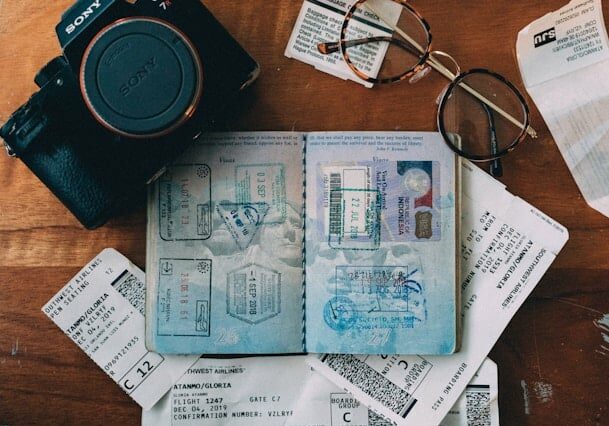Getting a second passport is an asset that most people can only dream of. It brings freedom, stability, and immeasurable opportunities for those who have them. While some people are lucky enough to be born with the right to multiple passports, others apply for a secondary passport later, sometimes through marriage, ancestral ties, or naturalization.
However, one of the best ways to get another passport for international travel and other purposes is through citizenship by investment – also called economic citizenship. This guide details how to do it and make the most of having a secondary citizenship.
How to Get a Second Passport
Obtaining a second passport has become an increasingly popular option for individuals seeking greater mobility, security, and opportunities. Various routes provide various options depending on one’s personal situation, heritage, and financial capacity. Each pathway has its own set of legal requirements and benefits, making it essential to research and plan carefully.
Citizenship by descent
Many countries provide citizenship to individuals who can prove that their parents, grandparents, or even great-grandparents were citizens of that country. This is a common route to getting EU Citizenship by Descent for countries like Ireland, Italy, and Poland.
Citizenship by naturalization
This involves living in a country for a certain period, often ranging from 5 to 10 years, and meeting other criteria such as language proficiency, cultural integration, and financial stability. Countries like Canada, Australia, Portugal, and Spain offer naturalization pathways.
Citizenship by investment
Several countries provide citizenship in exchange for a significant economic investment, such as real estate, business, or government bonds. Notable programs are offered by countries like Malta, Cyprus, and the Caribbean nations of St. Kitts and Nevis, and Dominica.
Marriage to a citizen
Marrying a citizen of a country can often expedite the process of obtaining citizenship. The requirements and waiting periods vary by country, with places like France and the United States having established processes for spousal citizenship.
What are the benefits of having a second passport?
There are many benefits to owning another passport. From enhanced global mobility to increased freedoms, here are some of the top benefits.
 Travel freedom
Travel freedom
Secondary passport benefits for frequent travelers are immense. Imagine being able to travel across the world without a visa or move and work freely in a number of different countries. Depending on the country of citizenship, second travel documents can expand your options to travel internationally.
 Global mobility
Global mobility
The opportunities that come with having a secondary citizenship for business purposes and other financial objectives can be innumerable. Whether concerning investment or business travel, a new passport from a high-ranking country on the Global Passport Index can widen your options and allow you to access a better and broader range of investments.
 Stability
Stability
Circumstances can change suddenly, as we all witnessed during the COVID-19 pandemic. Brexit in the UK and the recent political climate in the United States have also shown that having an additional citizenship and another passport can give you more options when making life-changing decisions for you and your family. Second passports provide peace of mind, increase personal and economic freedoms, and minimize risk.
If you’re looking to build a better future for yourself and your family, another country’s passport is the best way to ensure they will have a more secure life in the future.
 Easy retirement
Easy retirement
A second passport for retirement planning is one of the best options for individuals seeking retirement abroad. While you don’t need another passport to move to a new country, having that country’s passport simplifies the experience of living in a foreign country, particularly if you frequently return home to visit family. The generous tax benefits of having a passport from certain countries are also key in strategic retirement planning.
 Financial freedom
Financial freedom
One of the primary reasons Americans are looking to obtain a secondary passport is the economic freedom they offer, not just for the individual applicant but their family’s financial security. There may be the option for significant tax benefits by holding two passports, allowing you to live a tax-optimized life. An additional passport by investment program also provides investors with more options to open a bank account in a foreign country that may have strict banking regulations on non-citizens.
Second Passport by Investment
If you don’t hold the right to citizenship through descent, marriage, or naturalization, the easiest way to get an additional passport in a second country is through citizenship by investment. But what is the best additional passport for US citizens?
Residency by Investment (RBI) and Citizenship by Investment (CBI) programs are a great alternative. These programs exist in many countries worldwide and are designed to attract foreign capital and business people to boost certain nation’s economies. They allow qualifying investors and their family members to obtain residency or citizenship in a foreign country through substantial economic contributions.
Qualifying investments for CBI and RBI programs typically come in the form of real estate investments, financial contributions, or government bond purchases, but they can vary depending on the investment program chosen.
Portugal, Spain, and Caribbean countries like Dominica, Grenada, and St. Kitts and Nevis are some of the best countries to get a passport by investment.
It’s important to note that Residency by Investment and Citizenship by Investment are not the same. Residency by Investment typically grants foreigners a temporary residency permit, which allows them to live, work, and study in the host country. Therefore, it’s not a direct route to second citizenship.
Citizenship by Investment programs generally require a more significant initial investment, with the cheapest program starting with an investment of $100,000. Citizenship is a legal status that carries numerous legal implications and grants foreign investors a host of rights upon being granted citizenship. As such, fewer investment programs provide citizenship. There are currently 14 countries with citizenship by investment programs.
Best Countries for a Second Passport
There are several nations worldwide where it’s possible to acquire a second passport.
Below, we’ll explore the top options, including countries that offer citizenship by investment for a second passport.
Portugal

For those who prefer a traditional route, naturalization is an option. And, if you have Portuguese ancestors, you might be eligible to acquire Portugal Citizenship by Descent.
Spain

The Spain Golden Visa program, one of the most popular in Europe, is another route to citizenship. With excellent investment opportunities, the residency program in Spain attracts many investors and expats.
While the Spain Golden Visa program doesn’t offer citizenship, it is possible to get a Spanish passport after obtaining a GV and fulfilling the country’s residency requirements. You must maintain your investment and permanent residency in the nation for ten years to qualify for naturalization.
Greece

This program is popular among investors for numerous reasons, from the mesmerizing beaches and tranquil coastline to delicious Mediterranean cuisine and profound Greek history.
The region offers you flexible and lucrative investment options along with European residency.
Malta

Investors of the Malta Citizenship by Naturalization program can gain Maltese citizenship by naturalization within 12 to 36 months and acquire a Maltese passport by investing a minimum of €690,000.
The timeframe for EU citizenship can be reduced to 12 months for an investment of €840,000.
USA

The US EB-5 Permanent Resident Visa offers a Green Card first, followed by the possibility of US citizenship after the five-year mark.
While you must maintain your respective investment for at least five years (and your Green Card) to qualify for citizenship, it’s worth it if you intend to acquire double nationality in the United States.
Fastest Places to Get a Second Passport
If you’re looking for a quick solution to obtaining a second passport, the answer is citizenship by investment (CBI).
In the Caribbean, you can submit a fast-track second travel document application in countries such as Dominica and St. Lucia, starting from just a $100,000 investment. After successfully applying, you can gain dual nationality and a second passport benefits within six months.
Below, we’ll explore some of the fastest countries to get a second passport.
Vanuatu
The Vanuatu citizenship by investment program is the fastest citizenship scheme available. Vanuatu is also the only country in the South Pacific region providing a commonwealth passport to foreign investors. The process of applying for Vanuatu nationality is relatively simple.
In Vanuatu, citizenship by investment applicants do not need to visit the country as part of the program’s requirements. Successful applicants receive an official approval letter within two months of making a non-refundable contribution of $130,000 to the Vanuatu National Development Fund.
St Kitts and Nevis
St. Kitts and Nevis has one of the oldest citizenship-by-investment countries in the world. The St. Kitts and Nevis Citizenship by Investment Program allows applicants to choose between real estate investments and contributions to the Sustainable Growth Fund. With visa-free travel to over 150 countries and an attractive lifestyle, it remains a top choice for many seeking a second passport.
The program also offers a quick citizenship application process for potential investors to obtain Caribbean citizenship. The government will grant citizenship within four months to foreign nationals who fulfill the minimum investment amount and pass due diligence checks.
Dominica
Dominica’s Citizenship by Investment program is one of the most affordable and efficient options. Dominican citizenship can be easily acquired by contributing a minimum of $100,000 to economic growth in the country.
You can obtain citizenship and visa-free access to over 140 countries. The process is quick, and the island’s natural beauty adds to its appeal.
Antigua and Barbuda
Antigua and Barbuda Citizenship by Investment program offers multiple investment options, including real estate, business investments, or donations to the National Development Fund. Citizenship provides visa-free travel to over 140 countries, and the islands’ idyllic setting and relatively affordable investment make it an appealing option.
Second Passport and Dual Citizenship

While potentially quicker than others, citizenship by investment programs requires substantial financial outlays, typically in the form of real estate purchases, business investments, or contributions to government funds. Dual citizenship rules compound these complexities.
Some countries permit dual nationality, which allows individuals to retain their original nationality while acquiring a new one. However, others have strict regulations that may require individuals to renounce their original citizenship.
Several countries do not allow citizens to have another nationality, requiring individuals to renounce their original nationality when acquiring a new one. These countries include China, India, Japan, Saudi Arabia, and Norway. Such regulations ensure exclusive allegiance and simplify legal, tax, and civic responsibilities.
The implications of these policies are significant for expatriates and immigrants. They often face a difficult choice between retaining their original citizenship and gaining new rights and opportunities in another country. This can impact personal identity, legal status, and access to benefits and services across borders.
Taxation is another critical aspect. Dual citizens may be subject to tax obligations in both countries, necessitating careful planning to avoid double taxation. Understanding the tax treaties and regulations between the countries is crucial to managing financial responsibilities effectively.
How Can Global Citizen Solutions Help You?
Global Citizen Solutions is a boutique migration consultancy firm with years of experience delivering bespoke residence and citizenship by investment solutions for international families. With offices worldwide and an experienced, hands-on team, we have helped hundreds of clients worldwide acquire citizenship, residence visas, or homes while diversifying their portfolios with robust investments.
We guide you from start to finish, taking you beyond your citizenship or residency by investment application.

Frequently Asked Questions About a Second Passport
What is a second passport for?
It is a second travel document issued by a country’s government.
This could be a duplicate passport from one country, which acts as a replacement passport, or an alternative passport from a second country, which offers benefits beyond what the first passport provides.
Can I get a second passport?
Getting a second passport requires your country of origin and the second country of citizenship to accept dual or multiple citizenship.
You can obtain passports from two different countries if you qualify for dual nationality.
What is the cheapest second passport?
Dominica, St. Lucia, and Antigua and Barbuda offer the cheapest second passports, with a minimum investment of $100,000 to qualify for their citizenship programs through investment.
Which country gives the fastest passport?
Vanuatu, a South Pacific Ocean country, has the world’s fastest citizenship by investment program.
Successful applicants receive a second passport within 60 days of making the required contribution of $130,000.
Can US citizens get a second passport?
Americans can legally have a second passport as the United States permits dual nationality. As a US citizen, you’re free to get citizenship and a second passport in any country.
Where to apply for a second passport?
If you are unsure where would be the best place for you to invest in another passport, it can be a good idea to get in touch with a migration specialist.
This means you can receive expert advice from a market insider who can list options that best suit your personal preferences and financial goals.
Can you have three different passports?
Your capability of having three different passports or multiple citizenships depends on whether or not your countries of citizenship allow multiple citizenships.
For each additional passport you seek to obtain, you should check eligibility with your country’s passport services or immigration department.
Are there any second passport restrictions?
There are certain restrictions associated with using a second passport. While a second passport provides added flexibility for international travel, limitations exist.
For instance, you cannot use both passports interchangeably for the same trip or purpose; you must choose a passport to present to immigration authorities.
When traveling to a foreign nation, one passport may have a physical visa attached to it, which is the only passport you can use to enter and exit the country.
Furthermore, Americans with a US and foreign passport must present their US passport upon re-entry into the United States.
Are there any tax implications?
Having a second passport can potentially lead to tax implications, as taxation laws vary between countries and may impact your financial situation.
The US operates a citizenship-based taxation system, meaning US citizens are subject to paying US taxes regardless of where they obtain citizenship or permanently live.
This means that second citizenship and a second passport could require you to file taxes and report your worldwide income to both countries.
However, it’s important to note that tax laws and agreements between countries can be complex and subject to change.
What is the validity period?
Adult passports in most countries are typically valid for ten years. However, it’s important to note that the validity period can vary depending on the country, and certain countries have different renewal procedures or requirements for obtaining a second valid travel document.
Are there any risks with having a second passport?
One significant concern with obtaining citizenship in a second country is the potential for legal complexities or conflicts between the laws and regulations of the two countries.
This can pertain to taxation, military service obligations, or legal rights and responsibilities.
Additionally, some countries may restrict citizenship, and obtaining a second passport could jeopardize citizenship status in your primary country.
Moreover, if either country experiences political or diplomatic tensions, holding more than one citizenships could become a sensitive matter.



